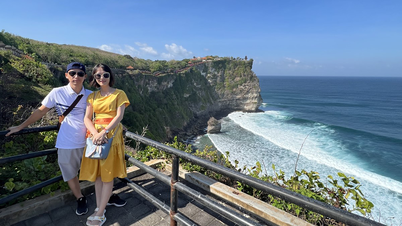Popular destinations such as Venice, Bali and Barcelona are charging tourist fees this year to tackle overcrowding.
Below are famous tourist destinations that will start charging tourist fees in 2024. The money collected will be used to upgrade infrastructure, roads, develop sustainable tourism, support people at tourist destinations, and protect the environment and nature.

People participate in a local festival on the island of Bali, Indonesia. Photo: Jakarta Post
Valencia, Spain
The tax, which applies to guests staying in all types of accommodation, including hotels, motels, apartments and campsites, comes into effect this year, but the government has not yet announced an official implementation date. Visitors will have to pay an additional 0.50 to 2 euros per night, depending on the accommodation, for a maximum of 7 nights. Guests arriving by cruise ship will have to pay 1.50 euros per day.
Bali, Indonesia
From February 14, Bali, known as the Land of the Gods, started charging 150,000 IDR (nearly 240,000 VND) for both domestic and international visitors at special booths at Ngurah Rai airport.
Venice, Italy
It has now been confirmed that the city will be testing a fee this year. Each visitor will have to pay 5 euros on weekends or peak days between April and mid-July. There will be 29 peak days where the fee will apply to same-day arrivals between 8:30am and 4pm. If you come to Venice for dinner or a concert after 4pm, you will not have to pay the fee.
Countries that charge tourist fees around the world 1. Spain (0.5-4 euros) 1 euro is equal to nearly 27,000 VND. |
Other countries still have to pay tourist fees in advance.
In 2022, the Spanish government announced that Barcelona's tourist tax would increase over the next two years. On April 1, 2023, each visitor will have to pay a tourist tax of 2.75 euros. From April 1 this year, the fee will increase to 3.25 euros and will apply to staying guests.
Cities located on the Balearic Islands, tax up to 4 euros per night in high season, applies to guests 16 years and over.
Guests must pay an overnight stay tax, which is included in their hotel bill in Austria. The tax varies depending on the province they are staying in. In Vienna or Salzburg, you will have to pay an additional 3.02% of your hotel bill per person.
The tourist tax in Belgium is also applied to accommodation, sometimes included in the room price but sometimes charged separately as an additional fee. Guests should check their bills carefully. In Antwerp and Bruges, the tax is calculated per room. Prices in Brussels vary depending on the size and rating of the hotel. The fee is around 7.50 euros.
A tourist fee is required when visiting Prague, Czech Republic , and is less than 1 euro per night, up to a maximum of 60 nights. The tax does not apply to children under 18 years of age.
Bulgaria applies a tourist fee to overnight stays, included in the room rate and running around 1.50 euros.
Croatia raised its tourist tax in 2019, but only during the peak summer season. Visitors pay around 1.33 euros in tax per night of stay.
In France, there is a 'taxe de séjour' to pay, which is added to your hotel bill and varies depending on the city. Prices range from 0.20 to 4 euros per night. In preparation for the 2024 Olympics, the tourist tax on hotel rooms increased by 200% from January. Depending on the type of accommodation, the fee ranges from 0.75 to 15 euros per night.
The tax in Germany is called a kulturförderabgabe (culture tax) or a bettensteuer (bed tax) in cities like Frankfurt, Hamburg and Berlin. The fee is around 5% of the hotel bill.
Tourist tax in Greece is based on the star rating of the hotel or the number of rooms you rent, and can be up to 4 euros.
The Hungarian tourist fee applies to Budapest only. Guests are charged an additional 4% per night on top of the room rate.
The Italian tourist tax depends on where you stay. In Sicily, it is 1-3 euros per night. In Rome, it is 3-7 euros depending on the room type. Some smaller cities charge more.
The Netherlands has a tourist tax on land and water. In Amsterdam, the amount is as much as 7% of the hotel room rate. In 2024, the fee will increase to 12.5%, making it the highest tourist tax in Europe, applying to overnight stays and cruise ship trips.
The tourist tax in Portugal applies to people aged 13 and over, is around 2 euros per night and applies in 13 of the country's 308 municipalities, including Lisbon, Porto and Faro. Guests only have to pay the tax for the first 7 days of their stay.
Tourist tax in Slovenia varies depending on location and hotel rating, being higher in larger cities and resorts like Ljubljana and Bled, around 3 euros.
Tourist tax in Switzerland varies depending on location, and is around 2.20 euros per night per person, applicable for stays of less than 40 days.
Caribbean islands all have tourist taxes that are added to the cost of hotels or departure fees. These include: Antigua and Barbuda, Aruba, Bahamas, Barbados, Bermuda, Bonaire, British Virgin Islands, Cayman Islands, Dominica, Dominican Republic, Grenada, Haiti, Jamaica, Montserrat, St. Kitts and Nevis, St. Lucia, St. Maarten, St. Vincent and the Grenadines, Trinidad and Tobago, and the US Virgin Islands. Fees range from 13 euros in the Bahamas to 45 euros in Antigua and Barbuda.
In New Zealand, visitors must pay an IVL tourist tax upon arrival, about 35 NZD (nearly 550,000 VND). Australian citizens are exempt.
Japan imposes a departure tax. Visitors to Japan must pay 1,000 yen (170,000 VND) when leaving the country.
Malaysia 's tourist tax is fixed and applies per night stay, around 4 euros.
According to a notice posted on the website of the Ministry of Tourism of Bhutan , visitors will have to pay a $200 per day sustainability fee from September 2022. From June 1, the government will apply a new incentive for long-stay visitors and it will be valid until the end of this year.
Guests who pay the full four-day tourism fee (800 USD) will be exempt from paying the fee for the next four days. Staying seven days will be exempt from paying seven days, staying 12 days will be exempt from paying the next 18 days. "Instead of paying the $6,000 sustainable development fee if staying for a full 30 days like before, now visitors only need to pay $2,400 USD," one tourist shared. The new policy is to encourage visitors to stay longer, spend more and come in larger numbers.
Hotel tax (occupancy tax) is applied in most states in the US . The highest rate is applied in Houston with a tax of 17% on hotel bills.
Anh Minh (According to EuroNews )
Source link




![[Photo] Prime Minister Pham Minh Chinh chairs the Government's online conference with localities](https://vphoto.vietnam.vn/thumb/1200x675/vietnam/resource/IMAGE/2025/10/5/264793cfb4404c63a701d235ff43e1bd)


![[Photo] Prime Minister Pham Minh Chinh launched a peak emulation campaign to achieve achievements in celebration of the 14th National Party Congress](https://vphoto.vietnam.vn/thumb/1200x675/vietnam/resource/IMAGE/2025/10/5/8869ec5cdbc740f58fbf2ae73f065076)


















































![[VIDEO] Summary of Petrovietnam's 50th Anniversary Ceremony](https://vphoto.vietnam.vn/thumb/402x226/vietnam/resource/IMAGE/2025/10/4/abe133bdb8114793a16d4fe3e5bd0f12)

![[VIDEO] GENERAL SECRETARY TO LAM AWARDS PETROVIETNAM 8 GOLDEN WORDS: "PIONEER - EXCELLENT - SUSTAINABLE - GLOBAL"](https://vphoto.vietnam.vn/thumb/402x226/vietnam/resource/IMAGE/2025/7/23/c2fdb48863e846cfa9fb8e6ea9cf44e7)





































Comment (0)